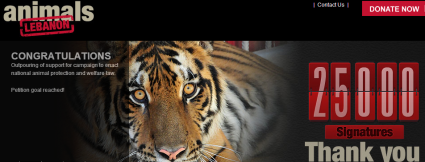
Lebanon made two steps in the right direction this week by first joining CITES, which is considered to be one of the most important conventions on endangered species and the law campaign that we actively took part in supporting on the blog is moving forward and is now open for public comment for the next 30 days before the Council of Ministers.
Under the proposed law, only licensed pet shops, zoos, circuses and other establishments that use animals would be able to operate, and even then only under strict guidelines.
The CITES (Convention on International Trade in Endangered Species of Wild Fauna and Flora) Secretariat is pleased to welcome the Lebanese Republic as the 178th Party to CITES.
Lebanon is located in the East Mediterranean. It is bordered by Syria to the north and east and Israel to the south. Lebanon is home to a wide variety of fauna and flora, including over 100 CITES-listed species, such as the common jackal, common wolf, red fox, common otter, jungle cat, wild cat, dalmatian pelican, black stork, greater flamingo, Eurasian spoonbill and various species of birds of prey (eagles, falcons, hawks and owls). CITES trade with Lebanon consists mainly of live plants, live birds, live tortoises, raw corals, reptile skins and leather products.
The Convention will enter into force for Lebanon on 26 May 2013. [Link]
Respect for Agriculture Minister Hussein Hajj Hassan for not ignoring this campaign and going through with legislation:
“Despite the challenges Lebanon faces, [the] top of which is the well-being of citizens, there is nothing which forbids us from also working to make Lebanon a better country in relation to animal welfare,” Agriculture Minister Hussein Hajj Hasan said in a joint statement from the ministry and the campaign group.
“Our culture, our morals, and our Islamic and Christian religious values all call us to be kind to animals, just as economic, financial and health interests require us to enact legislation related to animals.” [DailyStar]